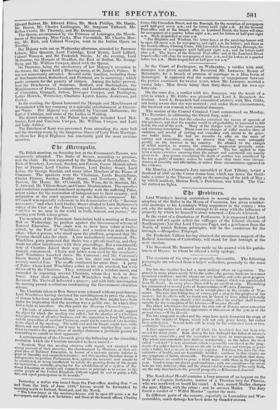tr,be Ortropolis.
The Polish meeting, on Saturday last, at the Freemason's Tavern, was numerously attended. The Duke of Sussex, according to promise, took the chair. He was supported by the Marquis of Breadalbane, the Earls of Rosebery, Lovelace, Sandon, and Euston, Count Montalembert Peer of France, Lord Charles Fitzroy, Lord Dudley Stuart, Lord Loftus, Sir George Sinclair, and many other Members of the house of Commons. The speakers were the Chairman, Lords Breadalbane, Charles Fitzroy, &whin, Dudley Stuart, and Roseberry, Mr. W. J. Denison, Mr. hume, Mr. O'Connell, Mr. Wyse, Sir G. Sinclair, Mr. T. Atwood, Mr. Villiers Stuart, and Count 3Iontalembert. The speeches and resolutions expressed continued sympathy with the suffering Poles, ardent wishes for the restoration of independence to their country, and indignation at the cruel oppression of the Russian conqueror. Mr. O'Connell was especially vehement in his denunciation of the "Russian miscreants ;" and when Lord Dudley Stuart alluded to Lord Melbourne's ettle!.y of the Czar at the Russia Company's dinner, as one who was inti.ri'ir to no man in the world in truth, honour, and justice," the :meeting sent forth a deep groan.
The members of the Protestant Association held a meeting at Exeter Hall on Wednesday, to petition against the Government scheme of National Education. The chair was to have been taken at twelve o'clock, by the Earl of Winchilsea ; and a motion was made to that effect ; when a person, who stood upon the platform, proposed that Mr. Cameron should take the chair. A row immediately commenced. The Winehilsea party protested that theirs watts private meeting, and they would not allow interference with their proceedings. But a considerable body of Chartists forced their way upon the platform, and a fierce struggle commenced. Chairs and tables were used by the assailants ; Lord Winehilsea knocked down Mr. Cameron ; and Mr. Cameron's friends floored Lord Winchilsea, tore his shirt and waistcoat, and severely mauled him. The scuffle continued for some time. A party of Police whom Lord Winehilsea called to his aid, attacked, but were driven oft' by the Chartists. They returned with a reinforcement, and succeeded in capturing several Chartists, whom they took to Bow Street. After their expulsion, Lord Winchilsea took the chair : the Reverend Mr. Thelwall delivered a prayer ; and with little interruption the meeting passed resolutions condemning the Government education scheme.
The Chartists taken to Bow Street were released without punishment; Lord Winchilsea having declared his unwillingness to press the charge of riotous behaviour against them, as he thought they might have been under the impression that the meeting was a public one, in which they had a right to interfere. On this point the Miumina Chronicle says- " The cards of' admission bore that every person admitted should support the object fir which the meeting was called ; but the election of a Chairman takes precedence of all other business, and the opposition to Lord Winchilsea, and the proposition of another Chairman, could not be construed into hostility to the object of the meeting. The noble earl and his friend: might have with- drawn, and met elsewhere ;'s but it may be questioned whether'they were en- tided to consider the proposition of ;Mother chairman a justifiable ground for committing an assault on their opponents." A erespondent of the Chronicle gives the following as the (sensible) -resolution which the Chartists intended to have moved- " Resolved, That this meeting observes with regret, not unmixed with strong mistrust of their sincerity,- the abandomnent by 'Ministers of their ori- ginal plan of National Education, in favour of a measure greatly inferior in
point of liberality and comprehensiveness: and this tneetine. therefore deems it indispensable to petition Parliament, first, against the meas‘ure now sought to
he substituted, as being insufficient to satisfy the growing desire of the iicople or thstraction ; secondly, praying for the establishment of a system of Na- tional Education so simple and Comprehensive in principle as to secure to the entire people of the United Kingdom, without regard to sect or party, a full, fair, and equal participation in its benefits."


























 Previous page
Previous page